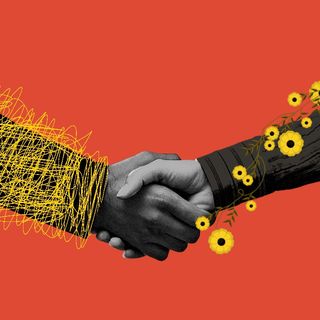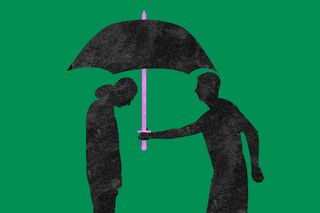
Self‑Sacrifice Isn’t Always Noble — Sometimes, It’s Weaponized to Manipulate Friends, Family
Some people may appear kind, but weaponize that very kindness and self-sacrifice to guilt others in doing their bidding.

An old friend of mine once had a colleague who made a point of overworking — even when it wasn’t required — and ensured everyone around her was aware of how she was “sacrificing” her youth by burying herself in paperwork. She rarely took sick leaves, and whenever anyone else on the team was sick and on leave, she’d volunteer to complete their non-urgent work for them. On the face of it, she strikes as immaculately noble; that could be a misjudgment of her character. Very soon, it became apparent that she was using her “selfless acts” as leverage to get what she wanted from those around her. From guilting her colleagues into buying her lunch and giving her free rides in their cars to urging them to accompany her to salons and nurseries for plants — she never hesitated to wave her unwarranted favors in their faces to get her way.
One might wonder, though: if she did so much for her colleagues, the least they could do is help her out — if not out of friendship, then out of gratitude. But neither did they ask her for favors, nor sign up to help her with her personal errands. In fact, some of them would rather do their own work, and spend their free time with their actual friends and families. Yet, they felt compelled to help her out. Here’s why: she weaponized her kindness to guilt-trip and, therefore, manipulate them into doing her bidding.
“Guilt is a powerful emotion and can therefore be a powerful tool of manipulation… [It] interferes with our decision-making processes and causes us to engage in actions or refrain from actions in a different way than we normally would,” says Leah Porritt, a behavior specialist.
Being guilted can induce feelings of unease and self-hate in people — by shaming them for not being good children, partners, friends, or in this case, colleagues — compelling them into doing things they may not otherwise have. It’s human nature, and precisely what some people — consciously or unconsciously — exploit. Some people “use [their] self-sacrifice to guilt other people, so that the guilt causes them to bend and conform to our will. By doing this, self-sacrifice becomes a way of buying [one’s] needs from other people. But it’s not a straightforward purchase type of transaction. Instead, it’s entrapment,” explains Teal Swan, a survivor of abuse, and an influential speaker in the domain of mental health. “Self-sacrifice can be used as a form of manipulation and control in any relationship.”
Related on The Swaddle:
The Stereotype That Abusers Are ‘Bad’ People Can Prevent Survivors From Recognizing Real‑Life Abuse
We live in a society that glorifies self-sacrifice; its common downsides — like conditioning women to be people-pleasers, and perpetuating patriarchy by hero-worshipping mothers, often only on specific days of the year — are well-documented. However, we continue to be rather ignorant of the abusive tendencies it can breed — probably because that aspect of it is so common, it’s normalized by the time we grow up.
As Indians, many of us have encountered — or been born to — parents, who withhold affection or punish their children for not behaving in the way they want, using their own sacrifices as a justification to do so. “A child did not ask their parents to be born. And yet, some parents act as if parenting — in and of itself — is an act of altruism, rather than love. [They] consider clothing, housing, feeding, and giving their child opportunities — which, by the way, can all be called ‘parenting’ — an act of self-sacrifice. They then hold that over the child’s head as a form of leverage. Anytime they want the child to do something — like [pick a specific career], get a specific job, marry a specific person… or take care of them when they’re older, they just have to remind the child that [they] ow[e their parents] because of how they sacrificed for [them] over the years,” Swan adds.
However, an individual weaponizing their kindness might not be doing so with the intent to abuse. People often perform grand gestures of selflessness — like taking on extra responsibilities, or giving up one’s hobbies and interests to prioritize their loved ones — with the expectation that their efforts will be recognized and appreciated. They might, indeed, have also convinced themselves that they are acting out of love and concern, which is not being recognized and reciprocated by the recipients of their kindness.
Here’s an illustrative case in point: a father who works long hours to provide for his children — sacrificing his social life, mental health, hobbies, and absolutely any form of recreation — might be doing so because he believes that’s precisely what a “good father” should do, even though his children might prefer hanging out with him rather than have him toiling around the clock to afford them luxuries. However, because he has decided to dedicate his life to the cause of improving theirs, in a manner chosen by him, if they don’t appreciate him enough, express their gratitude in the way he expects them to, or disobey him, he is likely to feel resentful and accuse them of being ungrateful and selfish.
Related on The Swaddle:
Indian Adults Are Leading ‘Double Lives’ to Avoid Controlling Parents. But What’s the Hidden Cost?
The glorification of self-sacrifice also leads to people feeling morally superior to others — especially so, when their constant reminders of how much they sacrificed for another fail to elicit a reaction from them. The holier-than-thou attitude, then, evolves as a mechanism to help them cope with the notion that their loved ones don’t value them. This is, then, followed by a mentality of self-victimization — reinforcing the cycle of being kind, weaponizing the said kindness, and either successfully leveraging it or wallowing sanctimoniously. “People trapped in that mentality believe that their suffering will be rewarded, so in reality, they do the ‘sacrifice’ waiting for something in return from the others, and when that does not happen, they feel used, which gives them an even further sense of being the virtuous one, of being a martyr,” writes Electra Matsangou, a psychologist.
In due time, experts note, they become unwilling to part with this mentality because it acts as their safety blanket — preventing them from recognizing the error of their ways, and hitting pause on the self-sacrifice because it would challenge the narrative that they have chosen for themselves.
Interestingly, however, the propensity to weaponize one’s kindness can, in fact, stem from the opposite of the mentality of self-victimization. Living with a savior complex, too, can prompt one to sacrifice their needs in a bid to seek external validation. Besides moral superiority, it can also imbue one with a sense of omnipotence and, of course, serve as leverage for guilt-tripping.
Prolonged guilt-tripping, however, can lead people to distance themselves from the ones weaponizing their kindness against them. At the same time, it can also cause them to internalize shame and guilt over time — trapping them in an endless cycle of abuse at the hands of people who employ similar tactics. Being victimized in this manner, over and over again, can also make one prone to the same mentality of self-victimization they observed in the people manipulating them — thus assuming the form of a learned behavioral trait. This is especially likely if, in their formative years, they noticed their caregivers constantly resort to self-victimization to get their way.
And thus, the cycle goes on. It also forces one to wonder: is self-sacrifice truly ever selfless, or merely the means to an end — even if that “end” is to simply feel better about oneself?
Devrupa Rakshit is an Associate Editor at The Swaddle. She is a lawyer by education, a poet by accident, a painter by shaukh, and autistic by birth. You can find her on Instagram @devruparakshit.
Related


The Difference Between an Eating Disorder and Disordered Eating, Explained
